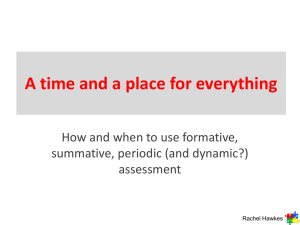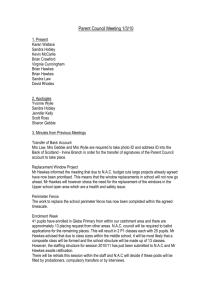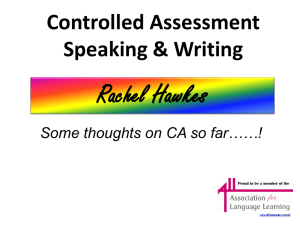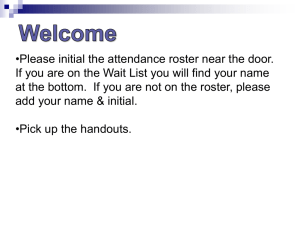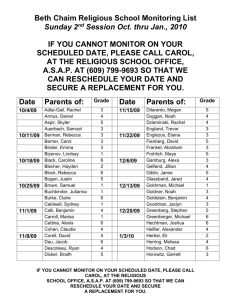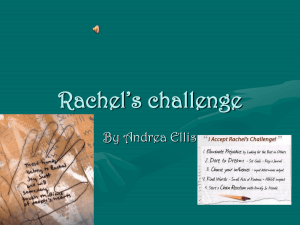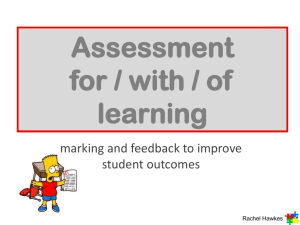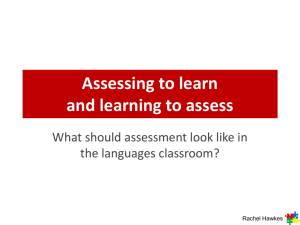Primary Languages Session 2:
advertisement
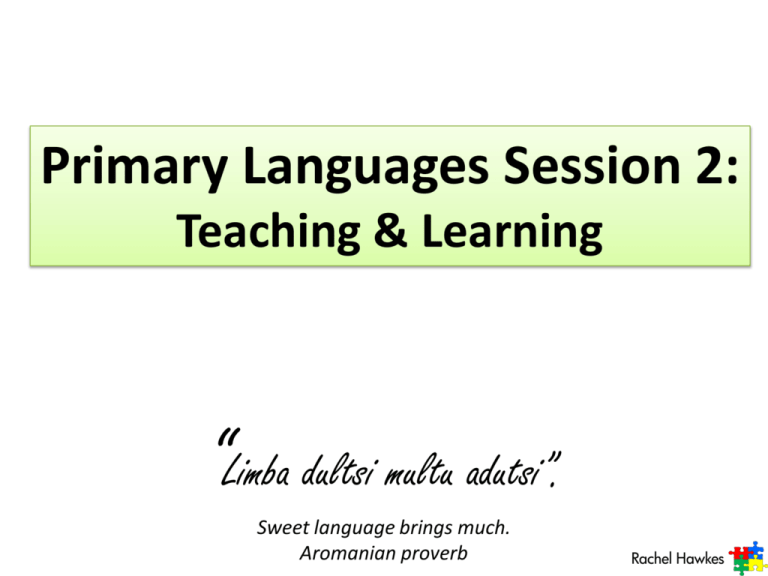
Primary Languages Session 2: Teaching & Learning “Limba dultsi multu adutsi”. Sweet language brings much. Aromanian proverb Rachel Hawkes Afrikaans Greek Lithuanian Shona Gujarati Mandarin Spanish Arabic Bengali Hausa Malayalam Swedish Cantonese Hebrew Norwegian Tagalog Dutch Hindi Turkish Nyanja Farsi Hungarian Panjabi Ukrainian Finnish Icelandic Polish Valenciano French Italian Russian Urdu German Japanese Serbian Welsh More than 36 languages are spoken by students at CVC Polish? Arabic? Portuguese? Did you know? There are around 7,000 languages spoken in the world! Name of Language I use this language…. Name of Language I use this language…. to read to sing Name of Language I use this language…. Rachel Hawkes Aims of this session • Teacher classroom language (Fr, Gm, Sp) • Key principles (Dos and Don’ts) • Websites and resources for teaching • Progression – Y3 sequence of lessons • Differentiation ideas Rachel Hawkes Teacher Language French: http://www.bbc.co.uk/schools/primaryfrench/teachers/teachers_audio_html.shtml Rachel Hawkes French: http://www.curriculumbits.com/prodimages/details/french/fre0001.html http://www.curriculumbits.com/prodimages/details/french/fre0002.html http://www.curriculumbits.com/prodimages/details/french/fre0003.html http://www.curriculumbits.com/prodimages/details/french/fre0004.html Rachel Hawkes http://french.about.com/od/vocabulary/a/classroomphrase.htm German equivalent: http://german.about.com/od/vocabulary/a/schoolTch.htm Rachel Hawkes http://www.eriding.net/mfl/ell_resources_fre.shtml http://www.eriding.net/mfl/ell_resources_spa.shtml http://www.eriding.net/mfl/ell_resources_ger.shtml http://languagesatmillthorpe.typepad.co.uk/york_language_colleges/french-posters/ http://www.bucksgfl.org.uk/mod/resource/view.php?id=12145 Buckinghamshire Grid for Learning – PowerPoint and 2 x word documents on French Teacher Target Language Rachel Hawkes German http://www.curriculumbits.com/prodimages/details/german/ger0003.html http://www.curriculumbits.com/prodimages/details/german/ger0002.html Rachel Hawkes Classroom instructions ¡Entrad! Come in! ¡Sentaos! Sit down! ¡Mirad la página…/la pizarra! Look at page…/the board! ¡Escuchad! Listen! ¡Repetid! (conmigo) Repeat! (with me) ¡Trabajad en parejas! Work in pairs! ¡Levantaos! Stand up! Praising/encouraging contributions from the class ¡Excelente! excellent! ¡Fantástico! great! ¡Muy bien! very good! ¡Bien hecho! well done! ¡Venga! Come on! ¡Ánimo, chicos! Come on everyone! ¡Vámonos! ¿Un voluntario? Let’s go. A volunteer? Rachel Hawkes es verdad es mentira ¡es estupendo! ¡es fatal! ¡Tengo un problema! ¡Tengo una idea! ¡He olvidado! ? ¿Cómo se dice en español? ¿Puedo hablar en inglés? ? x x x x x x No es fatal x No… No… No… No… ? ? No… No… ¿Cómo se hacen las frases negativas en español? No… ¡Se pone ‘no’ al principio de la frase! Some Dos Keep the quantity of new language to a minimum (7 new words) for each lesson Allow lots of opportunities to hear the new words (your voice, song, video etc.) Make questioning gradually progressive (physical response, repetition, choosing alternatives, independent production Include multiple and overlapping learning approaches (physical, visual, auditory) to fix language in memory Include a variety of activities – challenging but fun Encourage reflection, link-making and pattern-finding (just as you would in science) Use as much TL as you feel comfortable with (but plan your English and TL and avoid waffling) Rachel Hawkes Online resources • Interactive resources to use as you teach (Flash, video etc.) • Resources to download to use (PowerPoint, Word, Pdf etc.) • Resources to buy • Online games and activities for pupils to use Rachel Hawkes http://www.ngfl-cymru.org.uk/vtc/ngfl/french/primary_french/index.htm http://www.ngfl-cymru.org.uk/vtc/ngfl/spanish/spanish_songs/index.html http://www.bbc.co.uk/schools/primarylanguages/french/all_about_me/ http://www.bbc.co.uk/schools/primarylanguages/spanish Rachel Hawkes http://www.nicurriculum.org.uk/pl/ http://www.education.vic.gov.au/languagesonline/ Song downloads http://www.education.vic.gov.au/languagesonline/audio.htm http://www.education.vic.gov.au/languagesonline/german/german.htm http://www.education.vic.gov.au/languagesonline/french/french.htm Online resources • Interactive resources to use as you teach (Flash, video etc.) • Resources to download to use (PowerPoint, Word, Pdf etc.) • Resources to buy • Online games and activities for pupils to use Rachel Hawkes http://www.herefordlearning.org.uk/page.asp?PG_ID=32&GRP_ID=8 http://www.herefordlearning.org.uk/resources.asp?GRP_ID=10 http://www.herefordlearning.org.uk/page.asp?PG_ID=23&GRP_ID=9 http://wsgfl.westsussex.gov.uk/ccm/navigation/curriculum/modern-foreignlanguages/key-stage-2/ http://wsgfl.westsussex.gov.uk/ccm/navigation/curriculum/modern-foreignlanguages/key-stage-2/cross-curricular-resource-packs/ http://www.sunderlandschools.org/mfl-sunderland/resources-pr-frnewsunderlandmaterials.htm http://www.sunderlandschools.org/mfl-sunderland/resources-pr-fr-ks1.htm http://www.primaryresources.co.uk/mfl/mfl.htm This is a good source of teaching ideas in general as well as an extensive archive of French, German and Spanish teaching materials. Online resources • Interactive resources to use as you teach (Flash, video etc.) • Resources to download to use (PowerPoint, Word, Pdf etc.) • Resources to buy • Online games and activities for pupils to use Rachel Hawkes Rachel Hawkes http://www.earlystart.co.uk/about.htm Rachel Hawkes There are 16 short films (on DVD or video), each introducing a very small number of key words and phrases: These are the Pack 1 contents. Hola - greetings Adiós - saying goodbye ¿Qué tal? - asking people how they are ¿Cómo te llamas? - introducing yourself and asking other children's names Los colores - colours Los números 1-12 - numbers 1-12 ¿Cuántos años tienes? - saying how old you are and asking other children their age Los meses del año - the months of the year Los números 13-31 - numbers 13-31 ¿Cuándo es tu cumpleaños? - saying when your birthday is and asking other children when their birthdays are Los días de la semana - the days of the week ¿Qué día es hoy? - saying the date ¿Tienes hermanos? - talking about your brothers and sisters ¿Tienes alguna mascota? - talking about your pets En la clase - useful Spanish words and phrases that teachers and pupils can use in the classroom when playing games and participating in language learning activities. Rachel Hawkes Rachel Hawkes Online resources • Interactive resources to use as you teach (Flash, video etc.) • Resources to download to use (PowerPoint, Word, Pdf etc.) • Resources to buy • Online games and activities for pupils to use Rachel Hawkes Links to free online activities • http://www.languagesonline.org.uk/ • http://www.sunderlandschools.org/estrellas/ • http://www.atantot.co.uk/menu.htm (have to subscribe to this one now) • http://www.ltscotland.org.uk/c4modernlanguages/ • http://www.goethe.de/ins/jp/pro/goethe-haus/ • http://www.poissonrouge.com/redfish.php • http://www.learnalberta.ca/content/flbla/index.html Progression – a Y3 sequence Year 3 Term 1 Year 3 pupils started with the phonics, learning the vowels first and then other key sounds. They practised these using a variety of activities. They read rhyming stories, sang songs, practised tongue twisters and had further opportunities to make the sound-written link by listening to words and anticipating their spelling. Year 3 Term 2 In this term pupils learnt some nouns (pencil case and classroom items). They were made aware of gender through colour coding. They used the verb forms ‘tengo – I have’, ‘es – it is’ and implicitly encountered the negative forms of these. Rachel Hawkes Year 3 Term 3 The theme is animals and colours. The linguistic focus is gender, articles (definite & indefinite), plurals and adjectives (position & basic agreement). The grammatical concepts are all based around a core vocabulary of 9 animal nouns and 6 colours so nothing so becomes too difficult. The key verbs are ‘es’ (he/she/it is), ‘son’ (they are), hay (there is/are). The negative is revisited and there is also a subtle introduction to ‘también’ (also/too/as well), ‘pero’ (but). Pupils are encouraged at all times to strive to work things out for themselves, work in pairs and small groups sharing knowledge, and to speak aloud when possible – thereby building confidence. Pronunciation, memory, pattern finding, sentence building, autonomy, performance and creativity are the concepts at the heart of these resources. Rachel Hawkes Differentiation ideas • Supported extension (e.g. language booklet) • Oral differentiation (questioning strategies – e.g. non-verbal, true/false, alternatives (2,3,4), yes/no, what, opinions, reasons) • Medals • Online – further research about content or www.wordreference.com for more language • Dictionary skills • Task differentiation – fewer words, choose own words • Rewards for spontaneous language Rachel Hawkes Respond quickly and appropriately to audience comments or questions following a talk or narrative 1.5 – Y9 Use some complex language in a prepared but unscripted talk or narrative 1.5 – Y8 Plan and present a short talk or narrative, speaking clearly, audibly and with accurate pronunciation 1.5 – Y7 Progression in planned speaking Present a short piece of narrative either from memory or by reading aloud from text 06.2 – Oracy – Y6 Perform simple communicative tasks using single words, phrases and short sentences 03.3 – Oracy – Y3 Memorise and present a short spoken text 04.1 – Oracy – Y4 Prepare a short presentation on a familiar topic (from memory) O5.4 – Oracy – Y5 Rachel Hawkes Primary Languages Session 2: Teaching & Learning rhawkes@comberton.cambs.sch.uk www.rachelhawkes.com www.rachelhawkes.typepad.com/linguacom 01223 262503 ext.222 More useful links: TES collections: http://www.tes.co.uk/article.aspx?storyCode=6066908 My YouTube channel: http://www.youtube.com/rachelhawkes60 My delicious weblinks: http://www.delicious.com/rachelhawkes Rachel Hawkes
